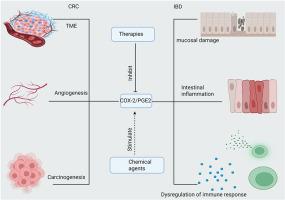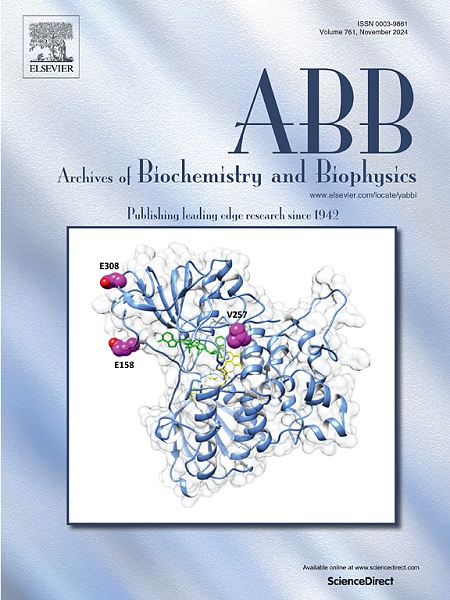COX-2在IBD及相关结直肠癌中的作用及其作为治疗靶点的应用
IF 3
3区 生物学
Q2 BIOCHEMISTRY & MOLECULAR BIOLOGY
引用次数: 0
摘要
炎症性肠病(IBD)是一种持续的胃肠道炎症,具有进展为结直肠癌(CRC)的显著风险。IBD和CRC的环氧化酶-2 (COX-2)水平升高,这在这些疾病中很重要。在IBD中,COX-2参与肠道炎症、粘膜损伤和免疫反应失调,而在CRC中,COX-2参与致癌,影响肿瘤微环境和血管生成。COX-2也可能通过前列腺素促进其有害功能。研究表明,在IBD和CRC中COX-2多态性增加了患这两种疾病的机会。研究人员已经认识到COX-2是结直肠癌的生物标志物。因此,抑制COX-2可能有助于预防IBD和CRC。非选择性和选择性COX-2抑制剂已被证明具有减轻IBD和CRC的能力;然而,它们的有效性和安全性下降。纳米颗粒、前药、小分子和聚合物底物可以将COX-2抑制剂输送到特定组织,这使得治疗更有效和更安全。因此,它们用于给药COX-2抑制剂可能预示着一个提高疗效和减少副作用的新时代。分子研究已经确定了新的化合物作为潜在的COX-2抑制剂。提取物、microrna和间充质干细胞也有助于靶向COX-2预防IBD和CRC。本文章由计算机程序翻译,如有差异,请以英文原文为准。

The role of COX-2 and its use as a therapeutic target in IBD and related colorectal cancer
Inflammatory bowel disease (IBD) is a persistent inflammation of the gastrointestinal tract with a significant risk of progression to colorectal cancer (CRC). IBD and CRC have increased cyclooxygenase-2 (COX-2) levels, which is important in these conditions. In IBD, COX-2 contributes to intestinal inflammation, mucosal injury, and immune response dysregulation, while in CRC, it contributes to carcinogenesis and influences tumor microenvironment and angiogenesis. COX-2 may also facilitate its harmful function via prostanoids. Research suggests that COX-2 polymorphisms in IBD and CRC elevate the chance of developing both conditions. Researchers have recognized COX-2 as a biomarker for CRC. Consequently, inhibiting COX-2 may aid in the prevention of IBD and CRC. Non-selective and selective COX-2 inhibitors have demonstrated the ability to mitigate IBD and CRC; however, their efficacy and safety diminish. Nanoparticles, prodrugs, small molecules, and polymeric substrates can deliver COX-2 inhibitors to specific tissues, which makes therapy more effective and safer. Consequently, their application for administering COX-2 inhibitors may herald a new era of improved effectiveness and reduced side effects. Molecular investigations have identified new compounds as potential COX-2 inhibitors. Extracts, microRNAs, and mesenchymal stem cells also help target COX-2 to prevent IBD and CRC.
求助全文
通过发布文献求助,成功后即可免费获取论文全文。
去求助
来源期刊

Archives of biochemistry and biophysics
生物-生化与分子生物学
CiteScore
7.40
自引率
0.00%
发文量
245
审稿时长
26 days
期刊介绍:
Archives of Biochemistry and Biophysics publishes quality original articles and reviews in the developing areas of biochemistry and biophysics.
Research Areas Include:
• Enzyme and protein structure, function, regulation. Folding, turnover, and post-translational processing
• Biological oxidations, free radical reactions, redox signaling, oxygenases, P450 reactions
• Signal transduction, receptors, membrane transport, intracellular signals. Cellular and integrated metabolism.
 求助内容:
求助内容: 应助结果提醒方式:
应助结果提醒方式:


